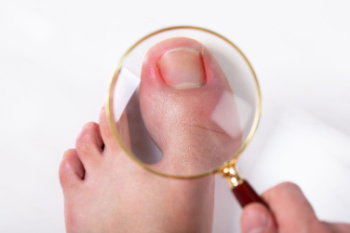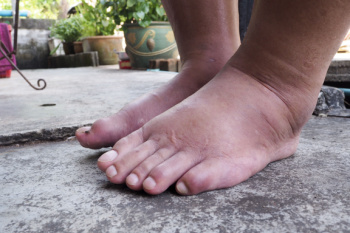Items filtered by date: August 2025
How Podiatrists Help Heal Foot Wounds

Podiatrists play a vital role in managing wounds on the feet and lower legs, which people with diabetes, poor circulation, or nerve damage are especially prone to. Foot wounds can heal slowly due to reduced blood flow and constant pressure from walking, increasing the risk of infection. A podiatrist begins with a detailed evaluation to identify the cause and severity of the wound. Treatment may involve removing damaged tissue, applying specialized dressings, and using offloading devices to reduce pressure on the affected area. They also monitor healing progress and work closely with other healthcare providers, when needed. Prompt, expert care from a podiatrist can prevent complications, including severe infection or limb loss. If you have a slow-healing or infected wound on your foot, it is suggested that you see a podiatrist promptly for professional assessment and effective care.
Wound care is an important part in dealing with diabetes. If you have diabetes and a foot wound or would like more information about wound care for diabetics, consult with Steven Wolfington, DPM from Sheboygan Foot Care, LLC. Our podiatrist will assess your condition and provide you with quality foot and ankle treatment.
What Is Wound Care?
Wound care is the practice of taking proper care of a wound. This can range from the smallest to the largest of wounds. While everyone can benefit from proper wound care, it is much more important for diabetics. Diabetics often suffer from poor blood circulation which causes wounds to heal much slower than they would in a non-diabetic.
What Is the Importance of Wound Care?
While it may not seem apparent with small ulcers on the foot, for diabetics, any size ulcer can become infected. Diabetics often also suffer from neuropathy, or nerve loss. This means they might not even feel when they have an ulcer on their foot. If the wound becomes severely infected, amputation may be necessary. Therefore, it is of the upmost importance to properly care for any and all foot wounds.
How to Care for Wounds
The best way to care for foot wounds is to prevent them. For diabetics, this means daily inspections of the feet for any signs of abnormalities or ulcers. It is also recommended to see a podiatrist several times a year for a foot inspection. If you do have an ulcer, run the wound under water to clear dirt from the wound; then apply antibiotic ointment to the wound and cover with a bandage. Bandages should be changed daily and keeping pressure off the wound is smart. It is advised to see a podiatrist, who can keep an eye on it.
If you have any questions please contact our office located in Sheboygan, WI . We offer the newest diagnostic and treatment technologies for all your foot and ankle needs.
When Ingrown Toenails Become Infected

An ingrown toenail happens when the edge of the nail presses into the surrounding skin, often causing pain and swelling. If bacteria enters the broken skin, the area can become infected. Signs of infection include redness, warmth, pus, and increased tenderness. Wearing tight shoes, improper nail trimming, or injury can increase the risk. Infections can spread if not treated promptly, sometimes leading to more serious problems. A podiatrist can safely remove the ingrown portion of the nail, clean the area, and recommend antibiotics, if necessary. For recurring cases, a minor procedure may be suggested to stop part of the nail from growing back. If your toe is painful, swollen, or shows signs of infection, it is suggested you visit a podiatrist for proper treatment.
Ingrown toenails may initially present themselves as a minor discomfort, but they may progress into an infection in the skin without proper treatment. For more information about ingrown toenails, contact Steven Wolfington, DPM of Sheboygan Foot Care, LLC. Our podiatrist can provide the care you need to keep you pain-free and on your feet.
Ingrown Toenails
Ingrown toenails are caused when the corner or side of a toenail grows into the soft flesh surrounding it. They often result in redness, swelling, pain, and in some cases, infection. This condition typically affects the big toe and may recur if it is not treated properly.
Causes
- Improper toenail trimming
- Genetics
- Improper shoe fitting
- Injury from pedicures or nail picking
- Abnormal gait
- Poor hygiene
You are more likely to develop an ingrown toenail if you are obese, have diabetes, arthritis, or have any fungal infection in your nails. Additionally, people who have foot or toe deformities are at a higher risk of developing an ingrown toenail.
Symptoms
Some symptoms of ingrown toenails are redness, swelling, and pain. In rare cases, there may be a yellowish drainage coming from the nail.
Treatment
Ignoring an ingrown toenail can have serious complications. Infections of the nail border can progress to a deeper soft-tissue infection, which can then turn into a bone infection. You should always speak with your podiatrist if you suspect you have an ingrown toenail, especially if you have diabetes or poor circulation.
If you have any questions, please feel free to contact our office located in Sheboygan, WI . We offer the newest diagnostic and treatment technologies for all your foot care needs.
Managing Swollen Feet

Swollen feet and ankles are a common but often overlooked issue that can signal underlying health problems. Causes range from standing for long periods to medical conditions like gout, arthritis, poor circulation, or kidney and heart issues. The swelling may appear as puffiness or tightness in the skin and can be accompanied by pain, warmth, redness, or even shiny, stretched skin. Some people also experience a heavy or throbbing sensation, reduced mobility, or difficulty fitting into shoes. Chronic swelling may lead to skin breakdown or infections if left untreated. A podiatrist can identify the root cause of swollen feet through physical examination, imaging, and circulation testing. Treatment may include compression therapy, custom orthotics, anti-inflammatory medication, dietary guidance, or referrals for additional medical care. They also provide strategies to reduce swelling and improve circulation. Swollen feet can be uncomfortable. If you have developed this condition, it is suggested that you schedule an appointment with a podiatrist who can determine what the cause is, and offer appropriate treatment solutions.
Swollen feet can be a sign of an underlying condition. If you have any concerns, contact Steven Wolfington, DPM of Sheboygan Foot Care, LLC. Our podiatrist can provide the care you need to keep you pain-free and on your feet.
Swollen feet are a common ailment among pregnant women and people who stand or sit for extended periods. Aging may increase the possibility of swollen feet and patients who are obese often notice when their feet are swelling too. There may be medical reasons why swollen feet occur:
- Phlebitis - A condition that causes the veins to become inflamed and can also cause leg pain.
- Liver disease - This may lead to low blood levels of albumin which is a protein. This can cause fluid in the blood to pass into the tissues and several areas of the body can become swollen.
- Heart failure - When the heart doesn’t pump properly the blood that is normally pumped back to the heart can pool in the veins of the legs causing swollen feet.
- Kidney disease - One of the main functions of the kidneys is releasing excess fluid in the body. This type of condition can make it difficult for the kidneys to function properly, and as a result the feet may become swollen.
- Deep-vein thrombosis (DVT)- This is a serious condition where blood clots form in the veins of the legs. They can block the return of blood from the legs to the heart which may cause the feet to swell. It is important to be treated by a podiatrist if this condition is present.
Swollen feet can also be caused by bone and tendon conditions, including fractures, arthritis, and tendinitis. Additionally, there may be skin and toenail conditions and an infection may cause the feet to swell. Patients who take medicine to treat high blood pressure may be prone to getting swollen feet.
Many patients elevate their feet to help relieve the swelling and this is generally a temporary remedy. When a podiatrist is consulted the reason behind the swelling can be uncovered and subsequently treated.
If you have any questions please contact our office located in Sheboygan, WI . We offer the newest diagnostic and treatment technologies for all your foot and ankle needs.

